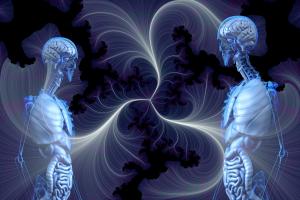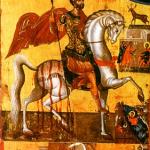
Marsilio Ficino, with his typical wisdom, explained why many people do not believe in God. He said that they do not sense or experience the divine realm because they have become too attached to material creation:
I need not say how people suffering from a bloody inflammation of the eye see everything as red, and those with a bitter taste on the tongue taste everything as bitter. In the same way the mind, which from a long-standing desire and indulgence in physical things has become physical, so to speak, will believe the divine to be completely non-existent, or will regard it as physical. [1]
Care must be had when reading this sentiment, care which Ficino does not always exercise in his writings. While we must make sure we are not unduly attached to material being, because that would indeed lead us to becoming blind to the spiritual realm, we must not reject material being and its goodness, because of if we did so, we would undermine God’s creation.
We are both material and spiritual. We must engage both aspects of our being. We must do so with a balanced approach, if we are to properly live out our lives. We must not ignore what happens in material being. We must not ignore physical suffering.
We must not think the material world and what happens in it is nothing. It was created by God, it is sustained by God, it is valued by God, and so it should be valued by us. The so-called Gnostics were in error when they tried to separate themselves from the world because of the evils they sensed existing in the world. The incarnation shows us that God values material creation just as much as he does spiritual being, and so we must continue to promote the good of material creation and do what we can to help those in material need. We must not abandon the world, because if we did so, we would turn away from our moral responsibilities. We must not imitate the fallen spirits who took pride in themselves instead of looking after and helping the rest of creation. We, such spiritual beings, have been established in the world to help guide it and protect all that is within it.
Once we realize that we must not abandon the material aspect of our being, that we must recognize and respect it, the danger Ficino mentions is real. If we abandon our spiritual qualities, if we focus exclusively on the material world, especially if our focus is on material gain, making some material good our highest good, we lose sight of the Good itself (which transcends but includes the material good). We will have limited our field of vision, and doing so, it should not surprise us that we will not perceive that which we no longer try to perceive. This is especially the problem we find if we try to establish some sort of economic materialism as the primary means by which we understand and view the world.
Capitalism is dangerous and leads us astray because it is dominated by the spirit of economic materialism. It offers the goods of the earth for sale, and suggests only that which is for sale has value. Since the absolute Good is not for sale, its value is denied. Is it no wonder that capitalism, when it denies the absolute Good, turns into a deadly consumerism? It embraces a nihilistic ethic, one which ultimately undermines and destroys even the various material goods it offers once they have been bought and sold. This is because when they are no longer for sale, they become worthless, and are put into the ever-growing trash dump polluting the world.
Is there any surprise that religion often appears to be in decline in societies which embrace some form of economic materialism as its greatest good? Some could argue, however, that this is because economic materialism is its own religion. It has established its notion of the greatest good (even if it runs contrary to the Good), money, and has people bowing down and worshiping it. Indeed, it requires many sacrifices in order to sustain its power over the people. Capitalism destroys the poor for the sake of the rich, and then tells people that this is necessary in order to preserve the system which brings about what it claims is the greatest good. And because of its religious nature, its adherents can be seen as if they are fighting against rival theologies, rival religious systems. Thus, while various religious traditions seem to be in decline, religion itself is not. People will find something to hold onto and follow with religious devotion, and this is exactly what we see coming from supporters of capitalism.
The nihilistic aspect of economical materialism means economic materialism will never satisfy. This is why, once its lies have been uncovered, people look for new religious faiths, new religious traditions: the spirit will always cry out for more, and so religion is not going to die out, though it might change its form, as it has throughout the centuries. It also encourages people to reexamine and reconsider those forms of religious faith which they have ignored or rejected. This is why many religions, when they seem to be dying out, suddenly reemerge in the world scene, and why many, who have thought that religion (or at least old, traditional religions) are dying out are proven wrong generation after generation. For people need what religion has to offer, and those religions which have been proven to last over long periods of time have much to offer, while new faiths, especially those which come out of some nihilistic rejection of the old, do not possess that vital quality that sustains them for long periods of time and are the ones which end up perishing.
We are embodied. We are spiritual. We need to realize the good in both is best sustained when the two come together as one. We must use both aspects of our being and bring them together as one under the Good from which they come. Then we will participate in the one eternal Good which alone can completely satisfy us. By learning how to unite two as one in ourselves, we begin to learn how to unite all that is in the world together and make them one. In that oneness, we will not only find the fullness of being, the fullness of truth, the fullness of the Good, we will also know how to act appropriately, to integrate the fullness of all things in ourselves, so that we become, not just idle spiritualists, but humans fulfilling our true potential.
[1] Marsilio Ficino, The Letters of Marsilio Ficino. Volume 4 (Liber I). trans. by members of the Language Department of the School of Economic Science, London (London: Shepheard-Walwyn, 1988), 11 [Letter 7: To Philosophers and Teachers of Sophistry].
Stay in touch! Like A Little Bit of Nothing on Facebook.
If you liked what you read, please consider sharing it with your friends and family!













